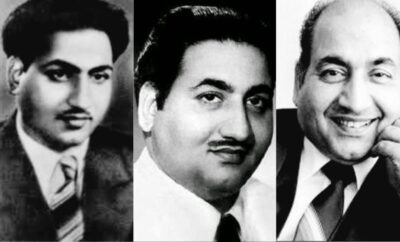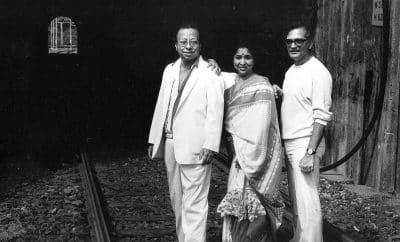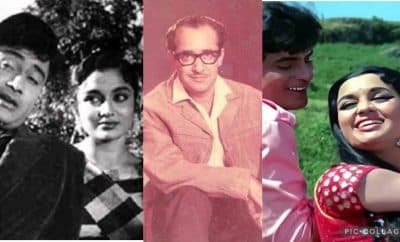Legends
Balgandharva – Parvardigar – The Supreme One
Narayan Sripad Rajhans better known as Balgandharva (he was conferred with this name by none other than Lokmanya Bal Gangadhar Tilak), was a genius in enacting a variety of female characters on stage. He was hailed as Nat-Samrat with an unbroken career span of 4 decades. He ruled the Marathi theatre with the music that was imbued with feelings.
Balgandharva (2011), a Marathi biopic on the artist, was made with Subodh Bhave playing the lead role with aplomb. While the original songs were retained for the film, new songs (situational) were composed by well known Marathi music director Kaushal Inamdar and written by Swanand Kirikre. One such song is a brilliant qawwali – Parvardigar. Kaushal Inamdar himself has written an account on making of this qawwali on his blog, in Marathi. I’ve tried to translate that in English for all music lovers who are not accustomed with the Marathi language. Hope you find this interesting.
Brilliance, dexterity or being genius, whatever you call it, is not customary or common. Talent comes naturally to the artists few and far between. Some artists just get a whiff of this geniusness while some just get a glimpse of it. But geniusness is like a restless soul. Even the best of the artist can’t give an assurance of its own free will.
Ilahi barish-e-abr-e-karam ho fasl duuni ho
Ki ‘baqar’ ki to aamad bas isi dil ki zameen tak ho….
The above sher by Sajjad Baqar Rizvi is all about the divine intervention towards his fate. Its interpretation for the divine benefation will give it a different meaning altogether. Creative thirst cannot be satisfied with these clouds of favours or mercy every time. One has to fetch these creative waters by moving mountains and finding the fountainhead. Since I’m an atheist, I don’t believe that the tunes which I make come to my mind due to some divine intervention. I was of the opinion that the music that I have heard so far, the music that has been inculcated in me, reflects in my music. And so in that sense I know I’m not a talented artist. And I’m not being modest here. I’ve seen some really talented artists and I’ve been inspired by their thought process. But I can’t depend on these clouds of favours or mercy. Sometimes it so happens that while moving those mountains one of the clouds is found embedded inside and you get a glimpse of something called divinity and its strength.
At times I’m confused about my own creations and ask – are these tunes really mine? Or is it some grace of the divine fate? You are not blessed with a ready tune always. There’s some sign, some link and then you get a way to move into that direction.
This is the story of the time when the movie ‘Balgandharva’ was being made. I was at Nitin Desai’s recording studio at Powai when I got a message from Ravi Jadhav about a new song situation in the movie. Screenwriter Abhiram Bhadkamkar explained the song situation to me – With his old age, Balgandharva loses his charm of holding the audience and is living a destitute life. At this time he’s invited by the Maharaja of Bhor. Balgandharva mistakes the invitation as that for his performance. He’s heartbroken when he realizes that he has been invited to present a mere sum of 500 rupees and a Pashmina shawl as a token of love and appreciation. There was a time when he had refused a sum of 1.5 lakh to keep his self respect. Though he didn’t refuse the honour, those 500 rupees felt like an insult to him specially in the time when he needed it. While returning back to Pune from Bhor, he stops at a dargah in Shivapur. He offers the pashmina shawl at the dargah and gives those 500 rupees to a fakir sitting outside.
Ravi Jadhav hinted me towards a song which would reflect the philosophy of Balgandharva’s life and suggested something on the lines of Khel mandala from Natrang or Kashi nashibana aaj thatta mandali from Pinjra. The song begins where Balgandharva gives money to the fakir.
I just suggested – Since the song is picturised in a dargah, why not opt for a qawwali?
Both Ravi and Abhiram liked the suggestion but then a qawwali in Balgandharva film looked totally out of place. We knew what we were getting into because he and his music did not have mere followers, people were devotees of his music. They not only loved his music but had credence too. At the end we gave ourselves 2-3 days to think about it.
That day I posted my thoughts on facebook – Thinking of doing a qawwali in the movie Balgandharva. And within an hour I started getting extreme reactions going against the qawaali in the movie. These reactions put me in double minds about the qawwali.
That evening I went to Ratnagiri for an event the next day. It was late night when I reached. But I wasn’t able to sleep. At last I started reading Chandrast, by Ravindra Pinge, which gives an account of the relationship between Gauharbai and Balgandharva when one sentence caught my attention. It read – Balgandharva called Gauharbai by the name Gauharbaba and Gauharbai in turn called him – Parvardigar!!
Parvardigar – The Supreme One.
Balgandharva was indeed the blessed one but this blessing was pushing his fate in the pit of darkness. Suddenly the words Pravardigar, parvardigar started to flow in my thoughts with a tune and my mind said – Qawwali it is!!
Balgandharva himself wouldn’t have opposed the thought since he never demarcated between the genres. I was reminded of Jayadev’s story.
Jayadev was writing Geet Govind where in one sloka he describes Radha’s bosom from the point of view of Krishna and then got distressed and disturbed by his own thoughts. How could he think about something so blasphemous? He tore the page where he had written it. He told his wife that he was going to the river to have a bath. He went out but came back within a few minutes. His wife asked the reason and he told that while he was going he had some thoughts and he wanted to write them down before he forgets. He goes into the room and closes the door. After some time the wife again sees Jayadev returning home from the river.
Surprised, she asks – when did you go out again?
Jayadev gets irritated and says – didn’t I tell you while leaving the house?
Wife – But then you came back in a few minutes.
Jayadev – I did not.
Both of them ran towards the room, the door was still closed and there was nobody inside. The sloka which had been discarded by Jayadev earlier had been written down in the book freshly again.
That word from Ravindra Pingey’s article, Parvardigar, was still hovering in my mind. It was 3 am and the tune for the word Parvardigar was already set in my mind. Swanand Kirkire was writing the new songs for the film (apart from original Balgandharva songs). I called him up in the morning and shared my thoughts with him. He not only agreed but penned the song the next day within an hour. Music arrangements by Prasad Sashte and Aditya Oak had been done wonderfully and Shankar Mahadevan poured soul in those words (Initial lines in Marathi have been rendered by Anand Bhate, another wonderful singer).
Movie was released and surprisingly there was no reaction against the qawwali.
Not the apparent tune but I cannot deny the fact that there was a divine intervention which showed me the direction for the song. Sometimes moving mountains is inevitable, but it becomes achievable only if it is in your ‘karam’.



